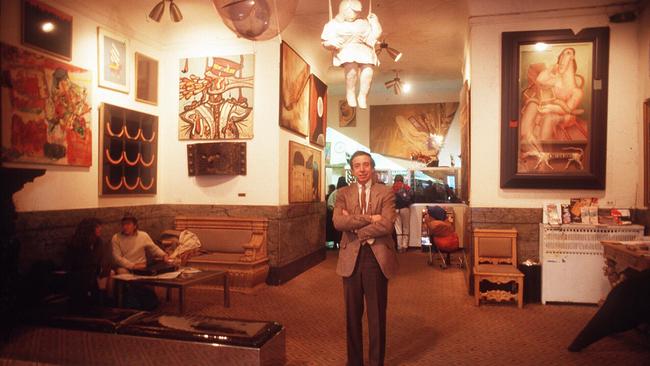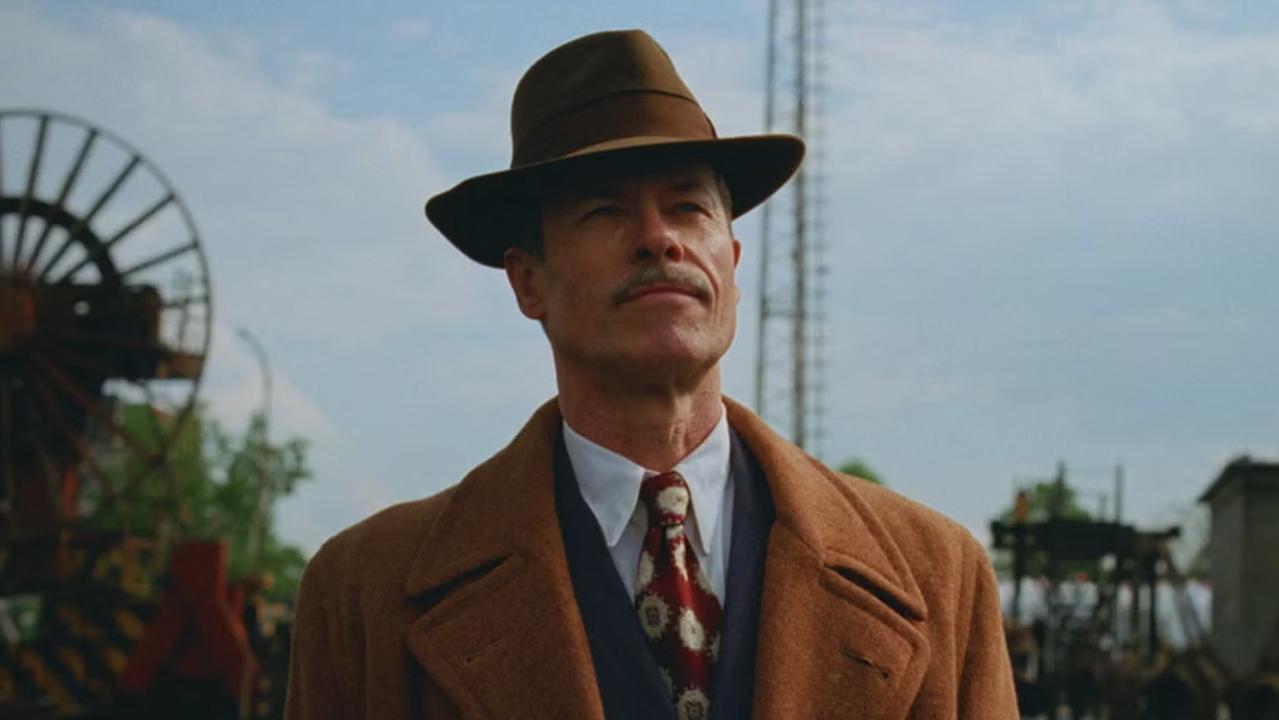Generous New York hotelier nurtured bohemian community of creatives
Stanley Bard, the proprietor of New York’s Hotel Chelsea, always saw his hotel as more than a commercial proposition.

If you had told Stanley Bard that he was running a commercial business during the 40 years he was the proprietor of New York’s Hotel Chelsea, he would have been mortally offended.
To Bard, the Chelsea was not a conventional hotel or a block of apartments for let, but a “community”, a bohemian enclave in the heart of Manhattan where he gave sanctuary to several generations of left-field artists, rock stars, writers, eccentrics, oddballs and ne’er-do-wells. His description of the demimonde that he encouraged to flourish inside the imposing 12-storey, 250-room gothic edifice on West 23rd Street as “strange and kooky” was not intended as an admission of the Chelsea’s shabbiness — it was a proudly defiant boast.
At different times under Bard’s stewardship the Chelsea was home to colonies of beatniks, hippies and punks — and to some of the 20th century’s most significant cultural icons, including Stanley Kubrick, Dennis Hopper, Brendan Behan, Leonard Cohen, Arthur Miller, Allen Ginsberg, William Burroughs, Bob Dylan, Joni Mitchell, Madonna and Robert Mapplethorpe. Artist Brett Whiteley also lived there in the late 1960s.
Almost every room seemed to have a story to tell. Arthur C. Clarke, who called the hotel his “spiritual home”, wrote 2001: A Space Odyssey there. Dylan penned many of the songs for his classic 1966 album Blonde on Blonde in Room 211. Leonard Cohen pleasured Janis Joplin in Room 202 and wrote about her “giving me head on the unmade bed” in a song he titled Chelsea Hotel #2.
A generation earlier in Room 205, Dylan Thomas had fallen into an alcohol-induced coma and died. In a later era, in Room 100, Sid Vicious of the Sex Pistols allegedly stabbed his girlfriend, Nancy Spungen, to death.
The Chelsea itself was seedy and the paint peeling. Water pipes coughed and clanked and electric wires dangled precariously. The dimly lit corridors were once described as having “the charm of a Soviet-era mental ward”. The cockroaches were said to be the size of rats and the housekeeping left much to be desired.
Arthur Miller, who moved in after his divorce from Marilyn Monroe, described a surreal conversation with Bard in which he attempted to persuade him to clean the carpets. “This hotel does not belong to America,” he wrote. “There are no vacuum cleaners, no rules and no shame.”
Yet Miller stayed for six years and wrote three plays there. Like so many other nonconformists, he found the Chelsea’s louche camaraderie infinitely preferable to the antiseptic luxury of a chain hotel.
Bard vetted his long-stay guests, embracing eccentricity and affording mavericks the warmest welcome in his rebel stockade.
Bard was short of stature and dapper, with clear blue eyes that peered from his rounded and beaming face, and his energy and enthusiasm were infectious. His relationship with the truth was sometimes tangential, yet he had a profound ability to believe his own dissembling.
In an essay about life in the Chelsea for Granta in 2002, Miller described his former landlord as possessing “a talent for overriding probability, an emotional fluency which sent his thoughts on swallow loops from subject to subject, a progressive, enthusiastic view of life. In a word, anarchy.”
Some accused him of being a “star f..ker”, but the jibe was mostly unfair. He took as much delight in nurturing the impecunious artists he took in as he did in befriending the celebrities who took up residence. To anyone admitted to his handpicked “community”, he was an excessively lenient and tolerant landlord. It was almost impossible to get evicted. On occasion he even lent his tenants money.
The only house rule seemed to be “anything goes”. When director Milos Forman went to live there in 1967 he reported that, on the floor above him, George Kleinsinger, composer of Tubby the Tuba, was sharing his room with a pet alligator, two monkeys and a python.
According to Barry Miles, pride of place in Arthur C. Clarke’s room was given to a giant telescope, which “wasn’t trained on the heavens but on the windows of the neighbouring apartments”.
Edie Sedgwick, one of the many from Andy Warhol’s set who stayed at the Chelsea, once set her mattress on fire at 2am, resulting in the hotel having to be evacuated. Unfazed and wearing their night clothes — or in some cases even less — the Chelsea’s bohemian clientele repaired en masse to the bar on the ground floor for a communal nightcap.
The hotel was the scene of several celebrated tragedies. Dylan Thomas drank himself to death there in 1953; Charles R. Jackson, author of The Lost Weekend, committed suicide in his room in 1968; and several drug addicts succumbed to fatal overdoses on the premises. Miles claimed that a policeman once knocked on the door of his room and, pointing to a dead body in the hallway, asked: “What do you know about this?”
Most notorious was the murder allegedly committed by Vicious, who died of a heroin overdose while on bail awaiting trial. Yet Bard had a Panglossian ability to disregard such mishaps. He claimed Vicious was a quiet and decent young man who had given no trouble until his girlfriend ended up dead on the bathroom floor in a pool of blood with a knife in her stomach. He then boarded up the door and subdivided the suite where the death occurred to prevent the room becoming a shrine. When asked in a 2008 documentary about deaths at the hotel, he disingenuously cited only portrait painter Alphaeus Cole, who lived in the hotel for 35 years and died there, aged 112, in 1988.
His positivity was endearing if not always convincing. In the book Legends of the Chelsea Hotel: Living With Artists and Outlaws in New York’s Rebel Mecca, a former resident told of seeing policemen in a room on the ninth floor and surmised that the junkie who lived there had overdosed. Bard corrected him: “The police officers were in fact guests at the hotel, and the junkie was vacationing abroad.”
Stanley Bard was born in 1934 in the Bronx, the son of Fanny Amigo and David Bard, Jewish immigrants from Hungary. His father became a hotelier by accident after being forced to abandon his profession as a furrier because of an allergy to fur. After selling his business, in 1939 he invested his money, with two partners, purchasing the Chelsea. Built in 1883 as New York’s first co-operative apartment house, the property had fallen on hard times.
After graduating from Christopher Columbus High School and New York University, Bard served briefly in the US Army before joining his father at the Chelsea in 1957. Majoring in accounting and psychology provided the skills to manage a hotel, although he initially worked at more menial tasks.
The Chelsea had developed a reputation as a popular haunt of writers, actors and artists in earlier decades. Mark Twain, O Henry, Thomas Wolfe, Sarah Bernhardt and Frida Kahlo had stayed there. Yet it was under Bard pere et fils that the hotel became the epicentre of New York bohemianism. During the 1950s Jack Kerouac worked on On the Road while staying there and William Burroughs wrote Naked Lunch.
On his father’s death in 1964, Bard became manager and majority shareholder, assisted in running the hotel by his first wife, Alice Beer, and later their son, David. They also had a daughter, Michele Bard Grabell. Alice died in 1988, and he was separated from his second wife, Phyllis Habber.
Oblivious to competition and resistant to gentrification, the indulgent regime that Bard ran at the Chelsea was too anarchic to last long into the new millennium. By 2007 the hotel’s board of directors had ousted him as manager. Four years later the Chelsea was sold to a developer for $US80 million and closed its doors to new guests. It is due to reopen in 2018.
Bard retired to Florida, where he died from a stroke. “I created something over so many years I thought was beautiful and worth preserving,” he said at the time.
“I don’t know what someone else will be able to contribute to that wonderful difference that took me a whole lifetime to create. I never wanted the Chelsea to be a conformist community.”
The Times


